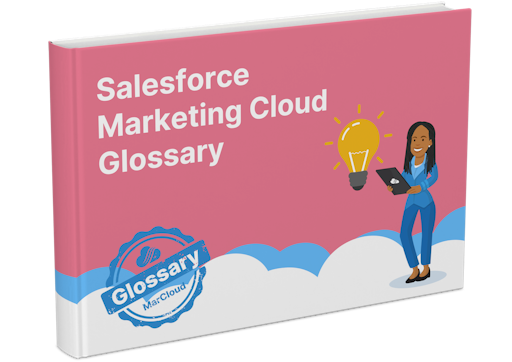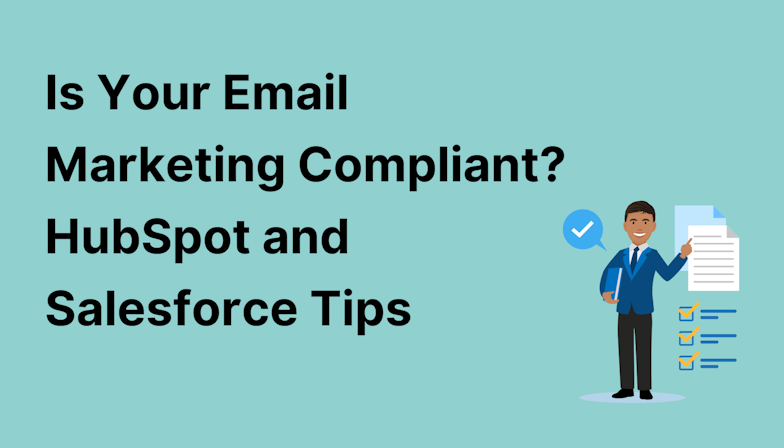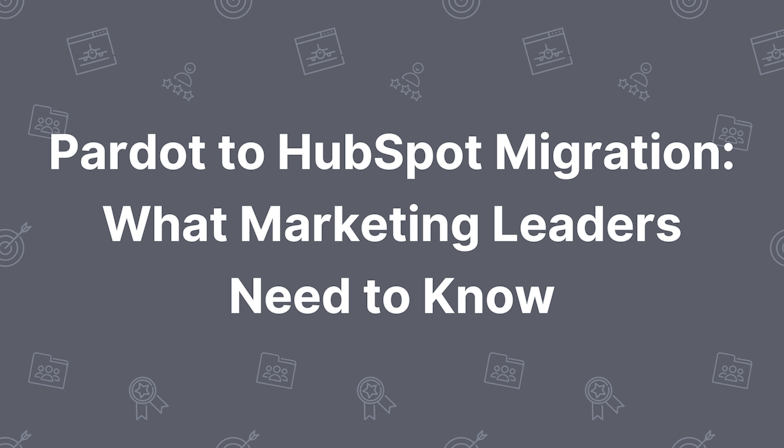This blog was written before Pardot was renamed to Marketing Cloud Account Engagement. You can read more about the name change and what it means here.
When it comes to choosing a marketing career path, there are plenty of options. From the creative side of copywriting, web and graphic design, to strategy and account management, there are specialist roles in all sorts of areas.
One of the most appealing marketing career paths right now, though, is to become an automation specialist or consultant.
Why?
Spend on marketing automation tools is projected to grow very quickly, to $25.1 billion annually by 2023.
Automation technology is fast becoming a crucial investment for businesses who want to up their marketing game. Which means businesses are in need of automation specialists to help implement and manage activities.
As somebody who has been in the automation industry for many years, I’ve witnessed first-hand the demand for automation specialists - particularly those who are experts in a specific platform, such as Pardot.
It’s why I do what I do.
Recently, I was invited to be a Guest Speaker for the University of Ottawa’s Telfer School of Management. As part of this, I delivered a Q&A session about all things marketing automation for the students of the Digital Marketing Certificate.
Below, you’ll find a transcript of the questions I was asked along with my answers. If you’re just starting out on your marketing career path, or still considering what you should study at university, this may help!
In a hurry? Skip to the question about automation as a marketing career path that interests you most…
- How did education help you to get into the marketing automation field?
- What do you enjoy about having a career in marketing automation?
- Tell us about a day in the life of a marketing automation consultant…
- What’s the difference between marketing ops in different industries?
- What are some cool strategies for converting web visitors?
- To gate or not to gate content?
- Which part of the buyer's journey do you prefer tackling the most?
- Do you follow other companies or leaders to learn more?
- What are your thoughts on using email as a marketing channel?
- What tips do you have for building email nurtures from scratch?
- How do you communicate to the sales team what emails are going out?
- Which stage of the funnel do you think is right for email nurture?
- What's some of the main metrics you're usually responsible for?
- What would you say is an unsung metric that not enough people track?
Q&A with Tom Ryan, Founder of MarCloud Consulting
How did education help you to get into the marketing automation field?
A few years ago now, I was back at uni studying a course called Business Enterprise Systems’. It was a degree where we combined IT and business. So there was some marketing to it, but not too much.
It was a degree where you're looking at big corporate business systems and how everything essentially connects. You're looking at different data flow diagrams, different relationships, and data modelling, which was very, very helpful for me because I now understand how data and systems interconnect. That’s definitely something I think everyone within the marketing operations space needs to know. It's a core thing that underpins CRM systems like Salesforce.
What do you enjoy about having a career in marketing automation?
Of course, there are lots of different disciplines in marketing. You've got your creatives, you've got your email marketers and copywriters and so on. Marketing operations and automation kind of integrates all of these.
As a marketing automation consultant, you’re that top-level person that brings all of the different units together. So when you're using a big system, you’re the go-to person to orchestrate the whole marketing activity across the marketing funnel. I always enjoy that.
Tell us about a day in the life of a marketing automation consultant…
In terms of day to day, mine's a little bit different from the typical consultant because I've got people working with me too. Generally speaking though, it's very much working with clients and providing solutions. As a consultant, you're providing solutions to problems.
It could be something as essential as a client saying, “We can't see revenue from our campaigns and we need to understand what is impactful. Is this webinar, or the email activity we run, doing anything?”
With the power of Salesforce and B2B marketing analytics, we can actually set up what’s needed to answer these questions.
When you get clients on board with your approach, it's really, really rewarding because you have a tangible system that you've built. You can say, “Okay, it's generated revenue. And your campaign performed very well because you're making these data-driven decisions”.
The most important thing is that you're not just saying this was successful. You're saying this was successful because, and it's a much more powerful statement. Especially when you're talking to people who control the budget. You can do more fun things with your marketing campaigns if you can justify and deliver results.
What’s the difference between marketing ops in different industries?
With everything marketing automation, it's all very much in context. So if you're in manufacturing versus financial services, the whole experience is going to be much different.
The objectives are different. You're dealing with situations and customers with a different customer lifecycle so all of your marketing changes and your reporting changes based on these different communications.
One example is that I once worked with a company that sells units through resellers. This isn’t a typical cycle because a lot of the time they refer customers out to the resellers. So you don't actually see the sale directly. They build the product and they ship it off to the different resellers.
So if someone buys the unit, they don't know who the end customer is but they know the reseller sold X amount of product.
In that case, reporting changes, the marketing changes, the whole sales management piece changes, which I think is quite an important thing to note.
It's completely different to say, business services or fintech. If you’re thinking of a career in marketing automation, it's important to try and pick an industry you love.
Fortunately for me, I love quite a lot of things, which is why I decided to start a consultancy and work with a bunch of different B2B businesses.

What are some cool strategies for converting web visitors?
The main thing to remember is people only really care about themselves.
When you're creating messaging, you have to think about pain points. What do they care about as an individual?
That information is how you work out what the coolest things are because it doesn't really matter what you think, it's what the end-user thinks about.
There are lots of creative ways I've seen companies move leads down the funnel. One of my favourite ones is actually from years ago, I worked at a marketing agency and we had a client who had a loyalty scheme for plumbers.
The plumbers were selling their plumbing units and the client had set up a scheme whereby every product would have a code on it. The incentive was that the plumbers would, every month, upload the product code to the loyalty platform.
Firstly, this generated month-on-month engagement, which we could analyse, and we knew who was engaging with what.
The plumbers would gain points each month and every month the client would reset the product code, so they would have to constantly use that product, which I thought was clever.
At the end of each month, they'd win something, while the client would get insight on the pipeline; they get insight on engagement with the actual product, they get brand awareness because the plumbers share it on Twitter and it's all very, very good in terms of engagement.
To gate or not to gate content?
Again, with anything marketing automation it really depends.
One thing you should be doing is strategising and sorting your content into stages.
If you have very early-stage content, very top level, generic information about what you do, kind of like the MarCloud blog where we share a lot of content about marketing automation, we wouldn’t gate this. You'd never gate a blog. It'd be quite weird to do that.
Whereas if you have a pricing guide, for example, or a detailed how-to document, you might want to reserve that for people in stage three, so you'd gate it; you might ask for an email or phone number.
Which part of the buyer's journey do you prefer tackling the most?
It’s a bit of a cop-out answer, but I like all of it!
When I say that, I mean, the whole top-level and strategic piece; mapping different touchpoints and understanding that you will likely already be aware of a company before you buy from them. It is rarely the case in B2B that you would go to a website and buy straightaway - you do your research first.
It might be that you were found by a company by a PPC click but then they read a blog on the website and downloaded a white paper. The next week, they attended a webinar and the week after that, they
downloaded another piece of content before filling in the enquiry form.
All of those touchpoints are important. When you use Salesforce data and different reporting methods, you can say the webinar contributed thousands of dollars or pounds because if it wasn't for the webinar, they wouldn't have gone on to download the next piece of content and then fill in the contact form. I like tracking all of that and seeing it work - it's really nice when it works.
Do you follow other companies or leaders to learn more?
This one's really easy, I learn from peers in my industry. I’d recommend just speaking to people in your field. There's a lot to learn from each other and one of the best things you can do is to just make friends and share knowledge.
What are your thoughts on using email as a marketing channel?
Stand out from the noise and do it well.
I like to think that we do this at MarCloud because we stick to what matters most; that people come to us for marketing automation advice. So we're not going to try to be anything else. We're not going to try to be quirky. We're not going to try and fool anyone with free stuff.
People are smart. So that's one thing to remember about your marketing is you don't try and trick anyone with stupid subject lines including free’ and capital letters.
It used to work about 10 years ago, and now it doesn’t. Standing out is just being good at what you do till the end.
Email marketing can be hugely effective, if it's done well. If you're authentic and if you respect opt-ins, stick to a consistent message, and don’t say what you wouldn't say to someone's face.

What tips do you have for building email nurtures from scratch?
Start with the end in mind. Whatever you're doing, just remember the objective. It's very, very easy to forget what you're doing and you can get caught up with sending multiple emails and all sorts.
We have seen that before where clients have had an automation program set up and the prospect gets to the end of the program and nothing happens to them.
We can't have that. What you need to do is map out a full journey and obviously use partners because hand-holding is needed a lot of the time.
How do you communicate to the sales team what emails are going out?
That’s a really good question actually. I've got a friend who is in sales and he used to get so annoyed when marketing sent his prospects emails and he didn’t know about it.
It is a frustration and it is a big deal because as a salesperson, if you're speaking to someone and you start to build up a little bit of rapport, which is quite hard in itself, then marketing go ahead and send them an email and it's completely irrelevant to the conversations that you're having, it's just a little bit messy and unprofessional.
So how would you fix that? With tools like Salesforce. There are other tools, this is just my preferred tool. You can very easily set up communication between the two teams. You can have a filter that just says do not market to this person. Then automatically remove them from any lists in Pardot or your email marketing platform. That communication is key.
Which stage of the funnel do you think is right for email nurture?
If someone's interested in your brand at any point, it’s an opportunity because all of your marketing efforts should be somewhat gearing up for the sale.
Not necessarily explicitly in a way that's pushy, but for all of your communications to be consistent to the stage of the funnel. It depends on the industry.
What's some of the main metrics you're usually responsible for?
Mostly conversions. We do a lot of technical edits and you know a lot of our work is project-based but when it does come down to the marketing, it really is about conversions.
What would you say is an unsung metric that not enough people track?
I would say this one is Campaign Member Status’. If you don't know what that is I’ll explain.
You might set up a Campaign in Salesforce, which is kind of like an umbrella for all of your marketing campaign assets; all of your forms, emails, landing pages, content, links etc. All of this stuff rolls up into a Salesforce Campaign.
Within that Campaign, we can split out Campaign Member Status’. So rather than just saying, “there are 1000 people in a Campaign and 10 Opportunities”’, you can actually say how many are engaged, how many are marketing-qualified leads (MQLs) and sales-qualified leads (SQLs).
It gives you a different picture to the overall view of Campaign performance.
With that, I’ll end this Q&A session about automation as a marketing career path, as this has turned out to be a lengthy piece of content!
If you’re due to graduate and have your eyes on a career in marketing automation - or you're already in the industry and want to change your marketing career path to specialise in this area - I hope this question and answer session has been helpful!
There is just so much potential for the industry right now, it’s going to be great to see where things go and I’ve no doubt those of you reading this will find your best marketing career path.
If you’d like to discuss anything automation or marketing-related, feel free to connect with me on LinkedIn.

Tom Ryan
Founder & CEO of MarCloud, Tom has been on both sides of the fence, client-side and agency, working with Salesforce platforms for the best part of a decade. He's a Salesforce Marketing Champion and certified consultant who loves to co-host webinars and pen original guides and articles. A regular contributor to online business and marketing publications, he's passionate about marketing automation and, along with the team, is rapidly making MarCloud the go-to place for Marketing Cloud and Salesforce expertise. He unapologetically uses the terms Pardot, Account Engagement and MCAE interchangeably.
More by Tom RyanFeatured resource

Salesforce Marketing Cloud Glossary
Even the most experienced Marketing Cloud users won’t always remember every single phrase or term! So, we’ve compiled an A-Z list of definitions you can download to your desktop or print out for your office wall – whichever way works best for you!
Download now
